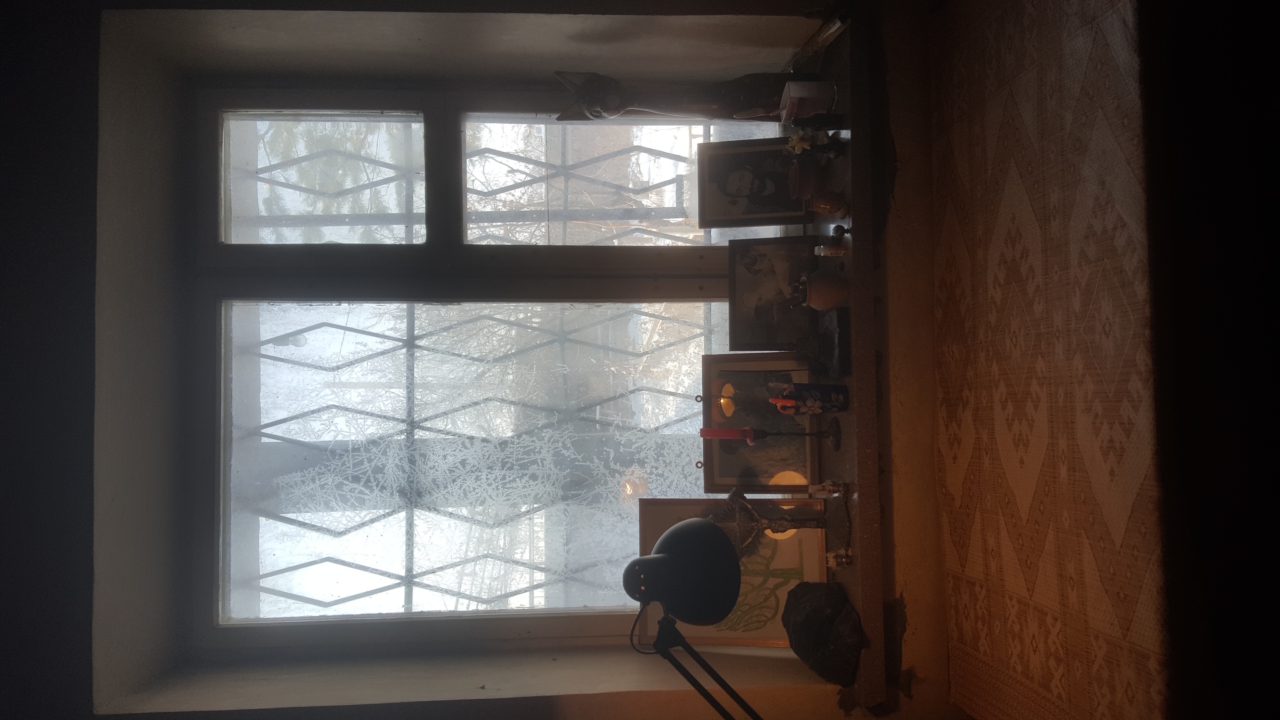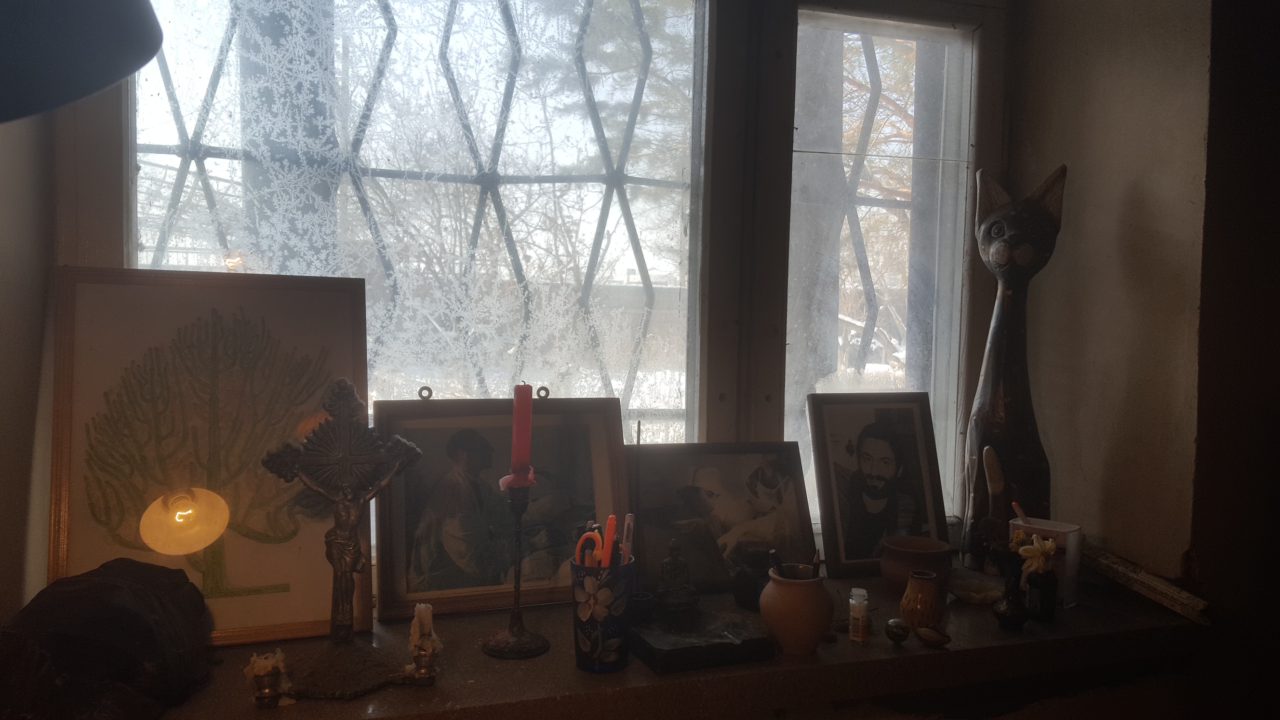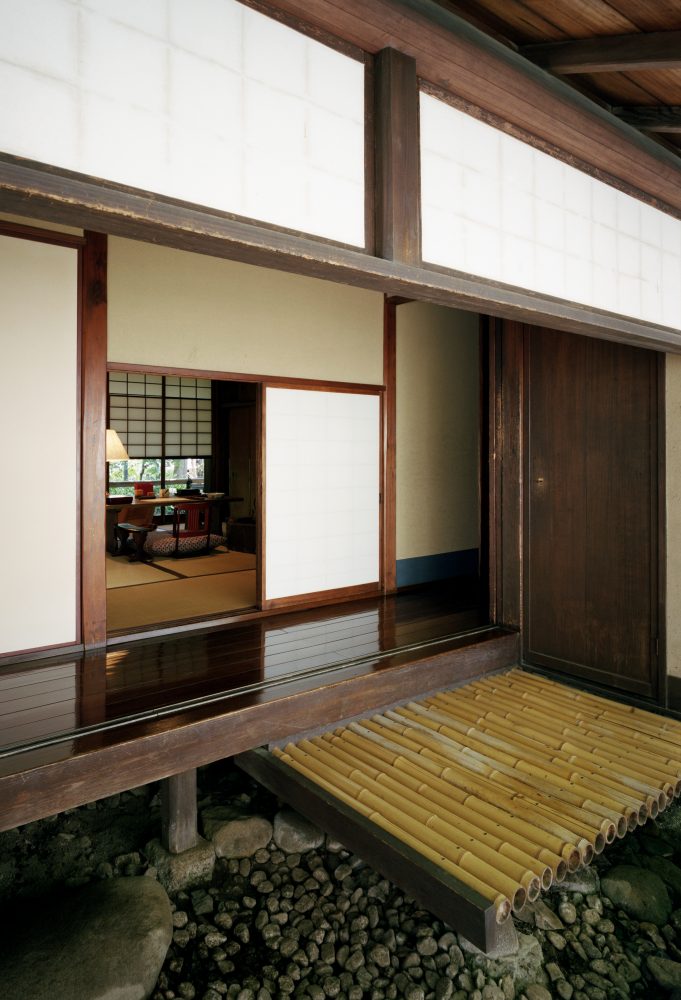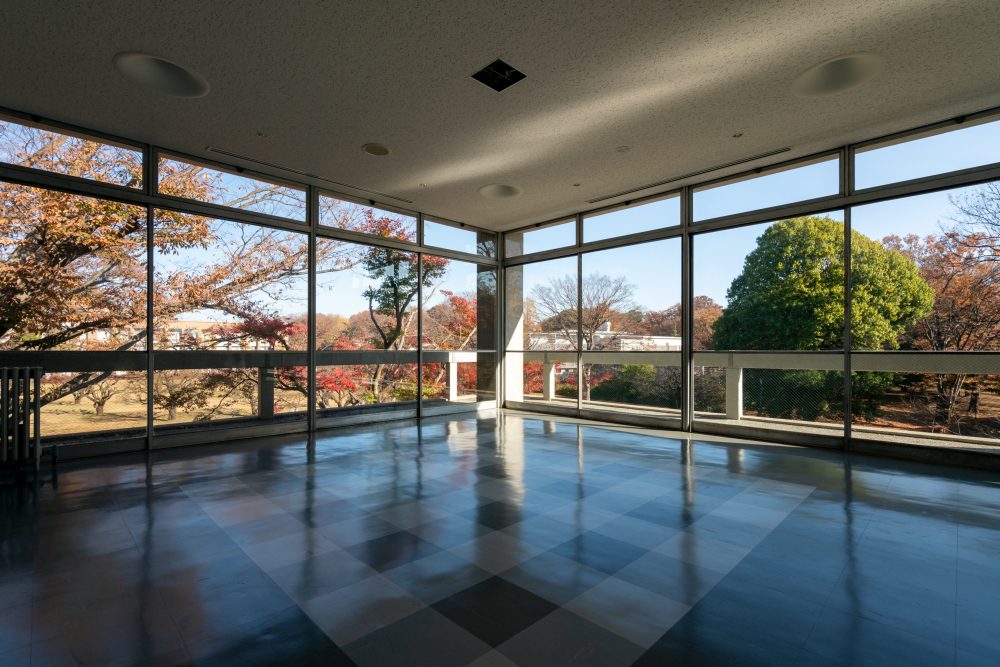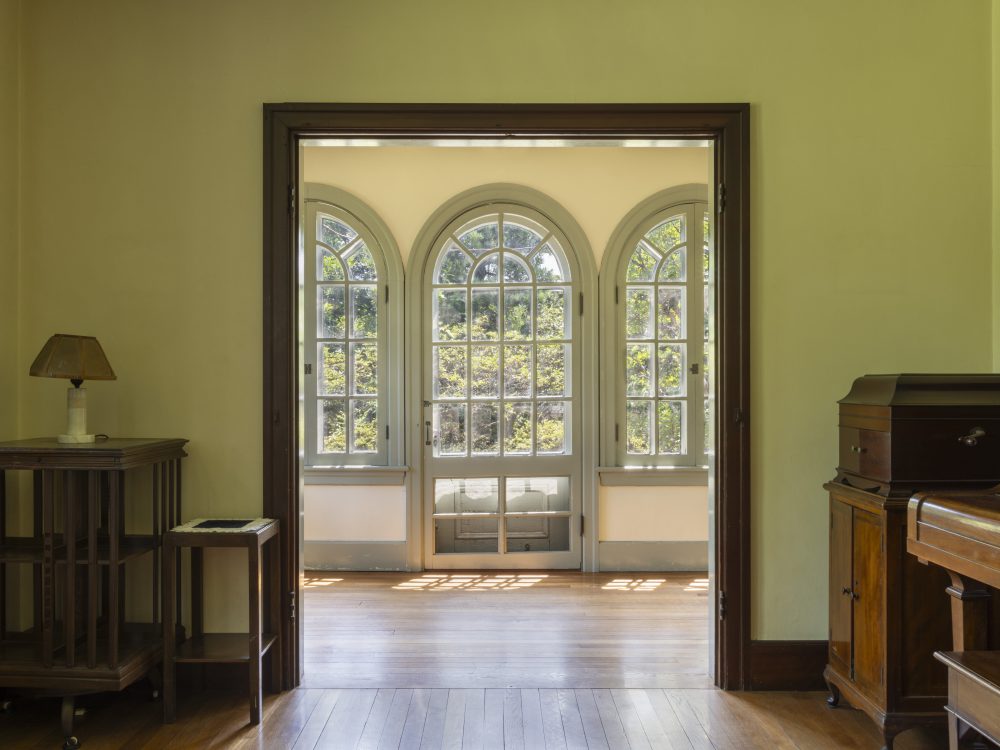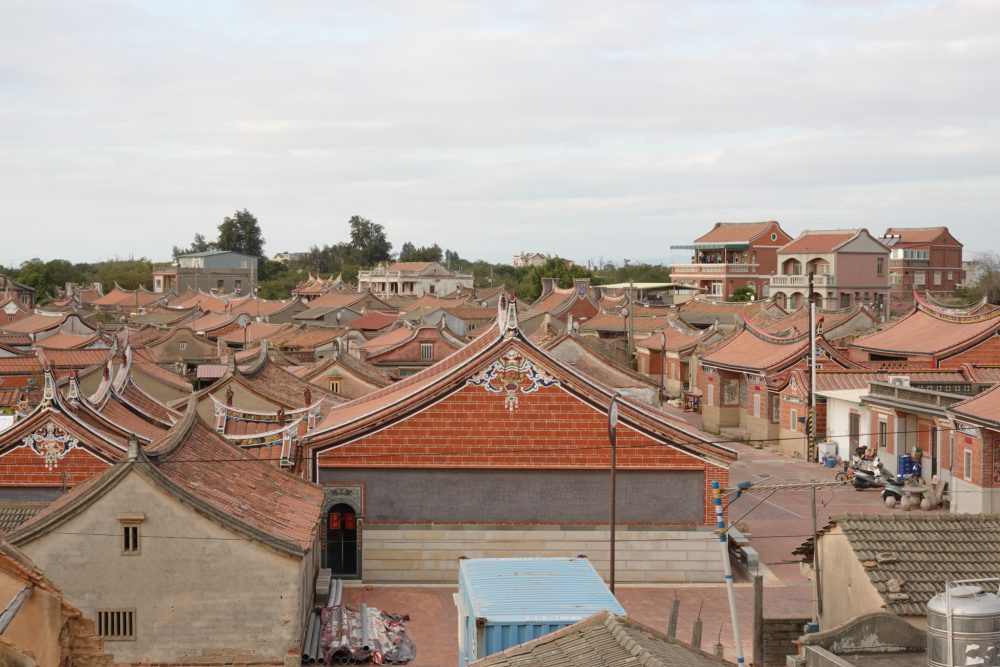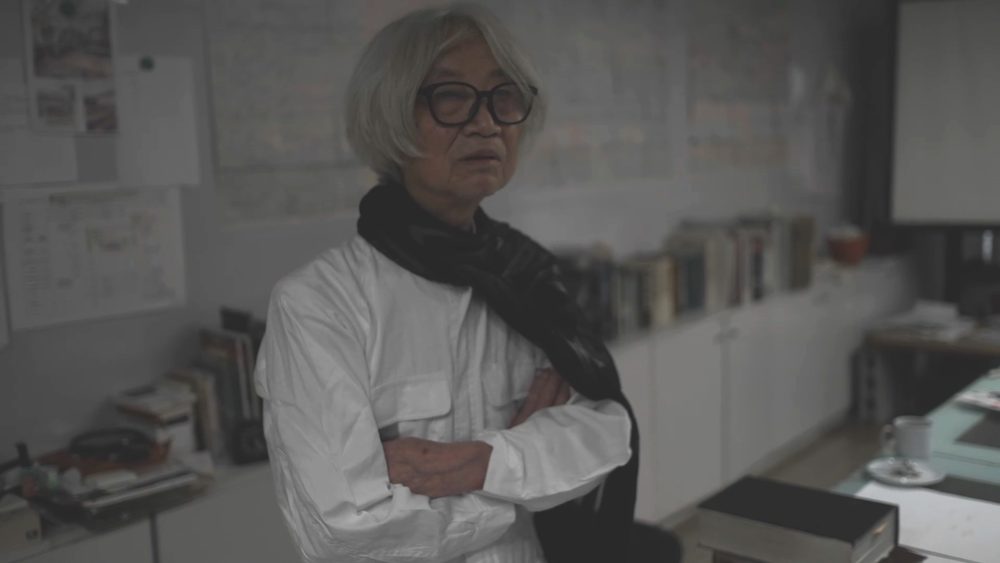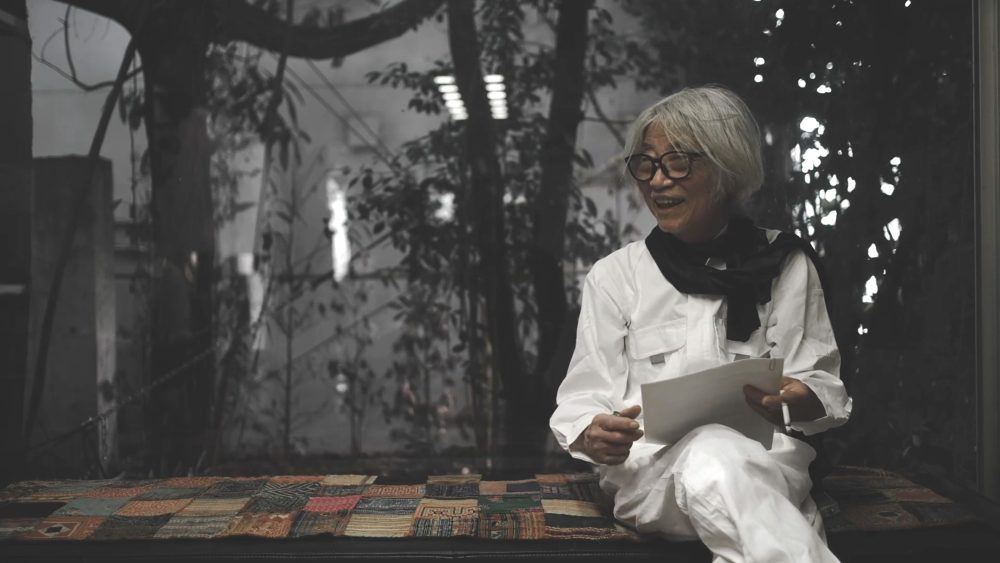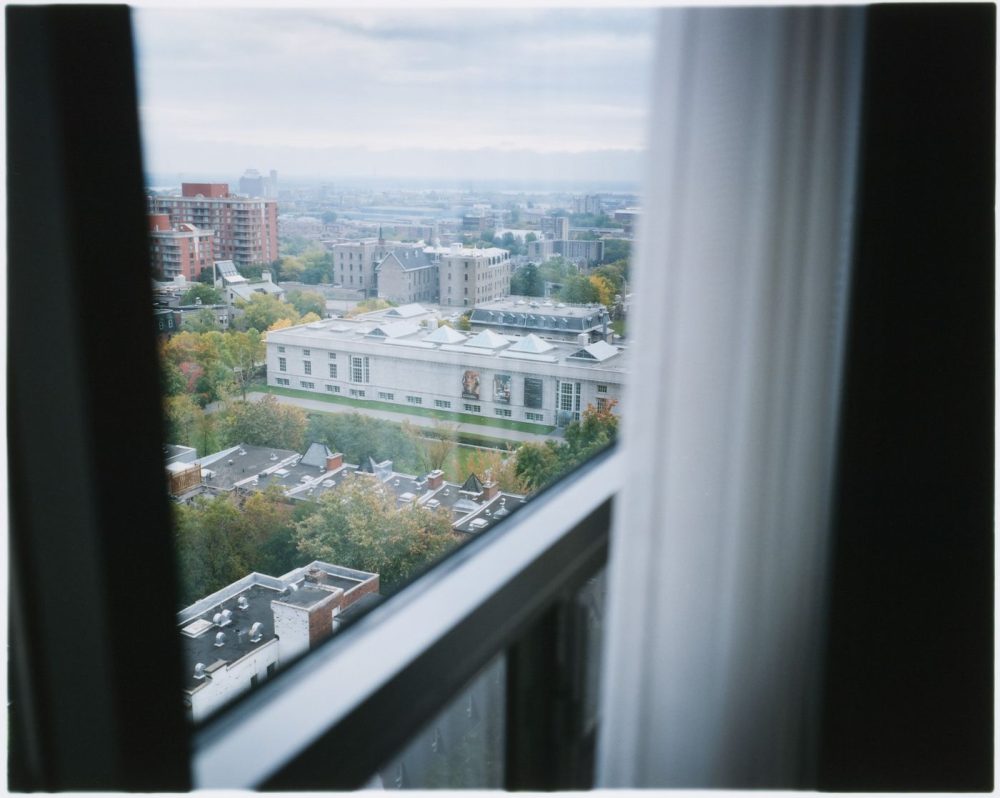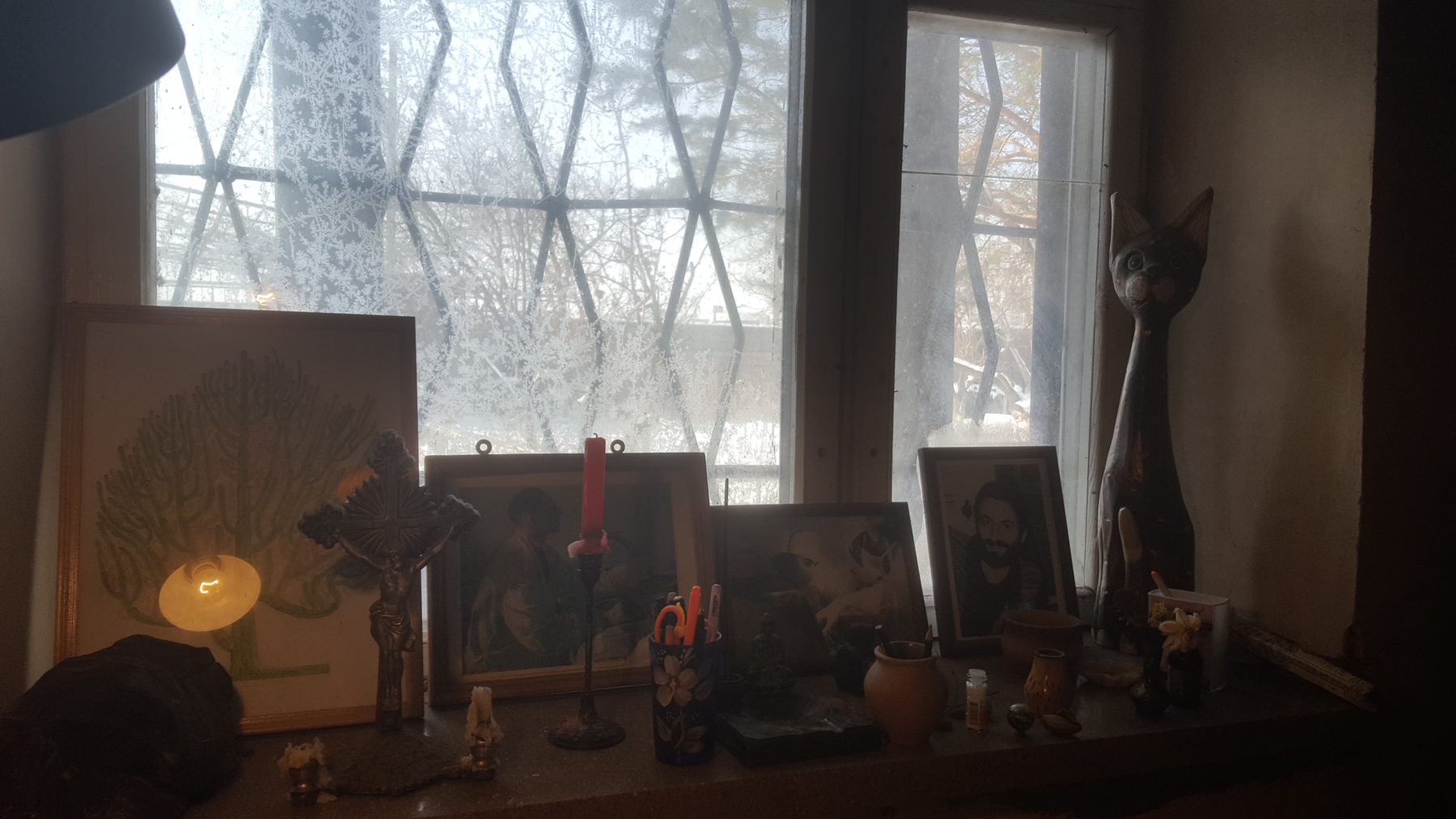
Yusho Takiguchi, Aram from Armenia
27 Apr 2021
- Keywords
- Columns
- Essays
- Literature
The atmosphere in a room viewed through a window. The outdoor scenery as you look through the window. The moving views you see from a train window. Windows give vague boundaries to our everyday lives, as if they were destined to be there. And windows can occasionally crop your view like a painting. The novelist Yusho Takiguchi walks you through a scene with windows, engaging with the various aspects of a person who has certain attachment to them.
The long-run residence program at the University of Iowa is where the Armenian writer Aram Pachyan and Takiguchi met for the first time. As Takiguchi reminisced about the program 3 years ago and the distance between himself and Aram, this current dialogue was initiated by Takiguchi as he wrote questions to Aram about his window at home.
Questions Yusho Takiguchi
・ Tell me about the windows in your room. About size, shape, color, materials and the scenery you can see from there…and anymore.
・How does the window affect your life or your work?
・If you have any ideas about the motif of “window”, please write freely.
My Window Aram Pachyan
1. The window in front of my desk is 1 meter 30 centimeters high, 1 meter 25 centimeters wide, it’s wooden with white frame. I see the backyard from my window, a part of the garden, grapevine and its bunches, which look like black sand grains on the surface. Out of it, you can see the iron gate of the house, the pillar holding electrical wires, looking like a spider net, and the thin and sensile line of the sky.
2. The house, which I inherited from my parents is in Yerevan, next to Qanaqer Hydroelectric Power Plant reservoir. I call it a sea. It is a sea, it has a harbor, fish, seaweed, stray dogs all around, lonely people, fishermen, trying their luck from dawn to twilight, and finally seagulls, which make rounds over the water chuckling like old men, then giggling like teens. I can’t see the sea from my window. Only the seagulls, hovering across the thin and sensile line of the sky and remind me of the existence of the sea.
3. I spent my childhood at a soviet condominium. Those condominiums, “communist skyscrapers”, are breathless and cold, with all identical windows. They look like fossils of devilish animals and people are hiding from dangers and fears between their bones. For those who live in those buildings the windows have enormous meaning. A window of a soviet condominium is a prison cell window, the last hope for the prisoner to be connected with the outside world. Hope, even if a piece of sky is seen from that window. This is why I give significance to the windows. Later it became obvious to me that what’s more important is the pure/mere existence of a window, even if that framed square looks over a wall.
4. It was the case in Iowa, once. I opened the door of room N229. I had to live in that room for around three months. I stepped in and walked to the window – it looked over a wall, nothing else. I got distressed at first. I had seen the view of Iowa river with its rich flora and birds. All of it was left behind the wall. I got used to it in a couple of days, I lined up my books on the windowsill, small objects, photo frames, postcards, pieces of paper, a flower pot. It was a good old habit, to create an illusionary world and make it real, then live and work in it.
5. It’s almost the same now. The window in my room, which is over my desk, is rather opening inside to awaken me, stir my memories, imagination, personal stories. On my windowsill I lined up fragments of imaginary and real worlds – my grandmother’s candle holder with Jesus Christ’s image, a volcanic rock, that I had found at a foot of a mountain, when I was 9-10 years old, a small statue of Buddha I bought for 2 dollars, my father’s photo, while he is operating on a patient, an almond stone, a flower vase with discolored flowers, the smile of my favorite fiction writer Ruben Filian, our family tree with one of leaves holding my own name. I am ready for a trip.
Aram from Armenia Yusho Takiguchi
Fall 2018- I was in Iowa. I participated in the University of Iowa’s The International Writing Program. It’s a residency program where all types of writers, from poets to novelists and journalists, from all over the world meet and spend about 10 weeks together. The residency is held in a small city called Iowa City where the university is also located.
We all had our own rooms at a hotel next to the university. Someone was complaining about the old hotel’s HVAC not working. But to me, who assumed before arriving in Iowa that I would get a little tiny room like one of those budget hotels in Japan, the hotel was more than enough and fabulous.
The International Writing Program has continued for more than 50 years, and actually there are many Japanese writers who have participated in the past. Kenji Nakagami, for instance, was a participant writer back in 1982, when he was 36. Nakagami’s book “America, America” (Kadokawa, 1985) mentions that the program, at the time, used an old apartment building where the writers were paired up to share the rooms. Imagine you are suddenly sharing a room with someone who speaks an unfamiliar language and with a completely different background. It seems that the accommodations were better considered after many problems amongst the participants, and the participants were now given individual rooms.
Even though the hotel’s main guests were scholars or academics (due to its location), many other guests also used the hotel during weekends for college football games, as well as family members of those who had weddings at the classic buildings in town. Unlike the hotels used for work trips in Japan, this hotel didn’t have single rooms hosting non-work travelers, and the rooms we had were mostly twin rooms, at various different dimensions and with different layouts.
I happened to have a room with one queen bed, and it was spacious and comfortable to sleep on it all by myself. Many of the other writers had a room with two single beds. The views from our windows weren’t the same either. My room faced the street and I could see the Iowa River which ran in front of the hotel, but from the rooms which faced the other way, all you could see were other buildings’ walls and rooftops. Big difference. Tomoka Shibasaki who was the writer in residence there two years before me, in 2016, repeatedly shows her disappointment at the view from her window in her book “公園へ行かないか? 火曜日に” [Wanna go to the park, on Tuesday?] (Shinchosha, 2018).
There weren’t many tasks for us to do during the program, and attending the events wasn’t mandatory either. I stayed busy with the work I brought with me from Japan, however, as I look back now, I think there were many days where I just wandered around without any plans, reading at cafes or in my room; a special luxury when compared to the life I had in Japan.
As we all spent more than 2 months at the same hotel in a small town, the writers naturally got to know each other well. It’s not that everyone becomes your best friend, but just like the classmates you had in school, some groups naturally formed. Our nationalities and languages must have played some roles in this process of group-making, however everyone’s relationship with each other and the level of comfort with others didn’t necessarily follow the maps and cultural groups you might expect.
Aram came from the south Caucasuses near the west end of Eurasia, Armenia. I came from the islands in the Far East: Japan. I cannot accurately convey as to how the two of us got very close. He spoke Armenian as I spoke Japanese. We communicated in English but neither of us, (especially I), were fluent in English. We somehow, gradually, became close friends. We were from different places speaking different languages, yet I found elements in me, while he also found elements in him- that brought us closer.
I didn’t casually visit other writers’ rooms, but I stopped by Aram’s room a few times, always with Kai (Huang Chong-Kai), a novelist from Taiwan. During the residency, our hair was getting long, and we decided to cut our hair with a clipper Kai borrowed from a student on campus. We set up Aram’s room as a temporary barbershop, with the hotel’s bath towels on the floor, dressed in barber capes which we also borrowed from somewhere, and then we took turns sitting in the chair at the hotel room’s desk. We all requested of each other to leave certain areas longer and then trim certain areas shorter. But an hour later we all ended up with shaved heads. We wrapped all of our cut-off hair with the towels, then dumped it into the Iowa River in front of the hotel.
The three of us were of the same generation; our late thirties. This was probably one of the reasons why we got close. Although these things we did together, as if we were college kids, are definitely good memories, what I distinctly recall the most is the view inside Aram’s room. The desk had many books, photographs, with many other different fragments.
I don’t remember all of the items precisely. But, as his answers to my questions in the letter show, he was decorating his room, which was far away from his normal life, with what he found or picked up and developed some sentimental attachment to, during his daily walks which were sometimes as far as 20 kilometers. He decorated the window from which he “could see nothing but the walls.”
I spent a lot of time with Aram in the US. I believe I can write about the way he was and his personality, based on my memories. However I don’t feel comfortable writing about the Aram that I knew, and I don’t think I want to either.
During the time we spent together there was always the language between us which we weren’t good at- English. What enriched our time with deeper colors were the impressions and emotions that couldn’t be verbalized between us with our own languages nor English, but they somehow reached the other’s mind and worked out between us.
Sometimes I didn’t know the word to express what I wanted to convey, or sometimes I didn’t understand the word he said to me. But from his facial and vocal expressions sometimes I could catch something, and I nodded to express my understanding of what he vaguely expressed. This was different from lying or pretending to understand. I found strength in understanding because of my inability to verbalize. Those times and how I spent them turn into something else as soon as I use my native vocabulary, and I believe that is why I don’t feel comfortable writing about him.
The answers in the letter he sent to me include the names of the various items he had by his window. To me, reading them becomes a description of Aram better than any words I could possibly write. Thereafter, this could be the same for anyone who doesn’t know him. He is a writer- that is why. Those names of the items by the window – the touch of Aram’s hand exist in them. His look exists in them as he saw them. But eventually, his gaze was directed out of the window, capturing the view from the window in his room.
I have never seen his town, Yerevan, as I haven’t been to Armenia. But I can visualize Aram’s eyes seeing Yerevan, even though I never have. The eyes that would end up finding some kind of sorrow even in beauty or fun. Novelists come with the eyes for the reverse. The eyes he had seeing Iowa, or New Orleans and New York City when we visited during the residency. What he wrote about, from the scenery his eyes saw to the atmosphere around his window, are his eyes. There is sorrow that he and his eyes see.
When the three of us (Kai included) were having our hair cut in Aram’s hotel room in Iowa, Aram was wearing a pale-green pullover shirt. It looked unusual to me, and I first thought it was either his room-wear or pajamas. But later he told me it was scrubs for medical workers, and also that it was a memento of his father who was a doctor. He showed me a photograph of his father as well.
That day, the three of us with our shaved heads went out to a Japanese restaurant in town and had some sake. Aram shared some stories of his military duties from his twenties. He was laid out near the border with Azerbaijan, and he lost many of his fellow soldiers.
Then Kai who is from Taiwan also shared some stories about his pre-recruitment training camp. I, of course, had no experience with military service. I don’t even have any experience with my country being at a war (my reality up to this point was that I was very well distanced from such things as the army or war). Being close in generation made clearer the gaps between us. Last September Armenia and Azerbaijan were back at war.
Being hesitant to verbalize about the Aram whom I met almost three years ago could be interpreted as cowardly. Not wanting to deform that closeness and my memories. What I can verbalize now isn’t what his eyes saw, but his eyes that I saw.
Yet, I might, without hesitation, verbalize about him in the context of the scenery he saw. I too am a writer and it’s not that it would happen when my closeness to him or those precious moments that don’t come in any specific form have aged, but rather, it would happen when reality adopts a new pigment of fiction within its color palette. Memories move around and I am not able to continue recalling every memory from three years ago exactly, and even up until now, I must have lost some memories or details. It is a pity, but (like those “fragments” he placed by the window) you can combine the reality and the fiction. And that is how you continue to keep what you don’t want to forget.
Aram Pachyan
Aram Pachyan is an acclaimed writer of independence generation, with several prizes, including the honorable Presidential Youth Prize. His first novel Goodbye, Bird has become a national bestseller in 2012 and is still in the top lists of bestselling Armenian literature. It has been translated into English, French, Bulgarian and the rights to Serbian are sold. He has been a writer in residence at Fall Residency of International Writing Program of the University of Iowa, Iowa, USA in 2018 and at Villa Waldberta, Munich, Germany in 2019.
BIBLIOGRAPHY
P/F, novel, Edge Publishing House, 2020
Ocean («Օվկիանոս»), short stories, Antares, 2014
Goodbye, Bird («Ցտեսություն, Ծիտ»), novel, Antares 2012, Edge 2019
Robinson («Ռոբինզոն»), short stories, Antares 2012, Edge 2019
Yusho Takiguchi
Yusho Takiguchi was born in Tokyo. He writes stories about individual and collective memory, marked by a roaming, omniscient narrative voice and multiple temporalities. In 2011, he was awarded the Shincho Prize for New Writers for his novella Gakki. His short story collection, Ai to Jinsei, was awarded the Noma Literary New Face Prize. His novel The Jimi Hendrix Experience was shortlisted for the Akutagawa Prize, and he won the Akutagawa Prize with his novella Shindeinaimono. He participated in the International Writing Program of the University of Iowa in 2018. His latest work is The Iowa Diaries.
